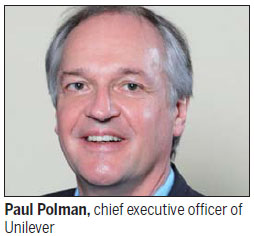Thinking big and caring big

Unilever CEO believes passion is key driver to success in leadership
Paul Polman says he cannot remember exactly how many times he has been to China since Jan 1, 2009, when he became chief executive officer of the multinational Anglo-Dutch company Unilever. But he has a clear picture of how to thrive and continue to thrive in the fast-moving consumer goods market in the world's second-largest economy, despite the slowdown in economic growth and increasingly fierce competition.
The veteran of the sector says he plays big in order to win. Acquiring the Qinyuan Group, a leading Chinese water purification business, in March is one of his strategies to become top dog the water purification market in China, an area expanding at a fast pace.
"It was a strategic investment to acquire a majority stake in Qinyuan and it was Unilever's largest investment in China in the past nearly two decades," says Polman.
The deal may more than double the size of Unilever's water purification business and will bring together complementary technologies from Pureit, Unilever's water purification brand, and Qinyuan, says Polman.
"We will leverage Qinyuan's local marketing insight, manufacturing and distribution strength all under the Unilever umbrella," says Polman.
Despite Unilever's plan to cut jobs and reduce personal care products by the end of 2014, China is still one of Unilever's growth engines.
In China, Unilever has no plan to either reduce the headcount or product lines because it is still experiencing rapidly expanding demand in the country. Instead, the company is expanding production capacity with a new plant under construction and due for completion soon.

Unilever has also been hiring and increasing the number of positions in various departments including sales and research and development. In lower-tier cities the company is planning to expand distribution channels and promote its most popular products to non-urban residents.
Polman says leading a fast-moving consumer goods company through its various ups and downs requires not only experience but also a broad vision to think big and care big.
The 60-year-old started his FMCG career in 1979 with Procter &Gamble Co. In 2001, he became US-based P&G's group president, Europe.
Polman was appointed as chief financial officer at Nestle SA in 2006 and was named by Investor Magazine as CFO of the Year in 2007.
In 2008 he became executive vice-president and Americas zone director of Nestle.
In 2008 Polman was appointed to be executive director to the boards of Unilever Plc and Unilever NV, the first time an external candidate was chosen for the role.
"A creative leader must have broad vision, to think with a broad perspective and care about big issues. He or she must have an open mind and be interested in new things. It is important to have passion because during the process of innovation there must be many failures, more than there are successes. You need the passion to carry on," says Polman.
In China a market experiencing increasingly tough competition Polman insists that fast growth is his target amid the fast progress of China's urbanization and the surging purchasing power of the expanding middle class.
"We are maintaining double-digit growth. We see no reason for not maintaining a positive prospect given the huge potential of the China market," says Polman.
It is the same situation for Unilever's competitors in China. In 2013 Nestle's sales increased by 2.7 percent to 92.2 billion Swiss francs ($104.6 billion). Meanwhile, its sales growth in China was 27.6 percent, much lower than the 91.4 percent it managed in 2012.P&G's sales in China surged more than 50 percent in the past three years to exceed $7 billion last year.
Now about 57 percent of Unilever's revenue is generated from emerging markets, among which China plays a significant role.
Macroeconomic conditions may affect the FMCG market with some more significantly affected than others. But as a multinational company with a long history and ample experience of dealing with such issues, Unilever will overcome the hard times, says Polman.
"So long as the population continues to grow, demand for FMCG will grow," says Polman.
The rising middle class demands quality products. From a global perspective, people's demand for FMCG increases 3 percent to 5 percent every year .
Most growth for Unilever is generated from emerging markets, says Polman.
The CEO believes even the increasing cost of labor, which is a concern to many multinational companies in China, may become an opportunity for growth. "As labor costs grow, purchasing power grows. China has been making great efforts to boost its domestic demand, which is also good news for FMGC suppliers such as us. At the same time we have observed that China is improving its healthcare and social welfare services, which will also push demand for quality FMGC," he says.
Wang Zhuoqiong contributed to the story.
wuyiyao@chinadaily.com.cn
(China Daily European Weekly 09/19/2014 page21)
Today's Top News
- Stable trade ties benefit China, US
- New engine powers cargo drone expansion
- China to boost intl cooperation on green tech
- Factory activity sees marginal improvement in November
- Venezuela slams US' 'colonial threat' on its airspace
- Xi: Strengthen cyberspace governance framework






























